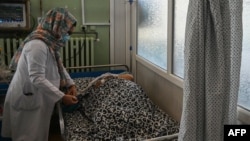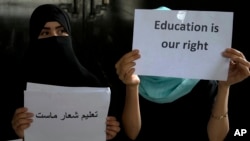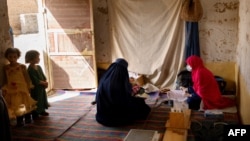The United Nations called on Afghanistan’s radical Taliban leaders Wednesday to refrain from implementing a recently reported decree that prohibits women from pursuing medical education in the crisis-ridden country.
The U.N. call comes amid a growing chorus of voices condemning and demanding that the Taliban reverse the directive, which critics said effectively removed the last remaining opportunity for Afghan women and girls to seek higher education.
“If implemented, the reported directive poses further restrictions on women and girls’ rights to education and access to healthcare,” the U.N. Assistance Mission in Afghanistan (UNAMA) cautioned in a statement.
It added that UNAMA is “extremely concerned” about the reported ban and is verifying it through official Taliban channels, but formal confirmation has not yet been received.
The directive issued by reclusive Taliban leader Hibatullah Akhundzada took effect Tuesday, a day after it was communicated to heads from all medical schools at a meeting in Kabul, health officials and participants told VOA. They spoke anonymously because they were told not to discuss the matter publicly.
Taliban officials at the Public Health Ministry have not yet commented on the reported decree or the meeting that took place in the Afghan capital on Monday.
The U.N. cautioned the decree would have a “detrimental impact” on the Afghan health care system and the development of the impoverished South Asian country.
“UNAMA urges the de facto authorities to reconsider implementing the reported directive in view of its negative implications on the lives of Afghan women and girls and all people across the country,” the organization said in the statement.
Local media reported that more than 30,000 women and girls were enrolled in Afghan medical institutions nationwide, and many were scheduled to take their exams starting Tuesday when the ban abruptly took effect. Women training as midwives and nurses were ordered not to return to classes.
Human rights activists have warned the ban will deprive millions of women of essential health care services, including midwives and female nurses, in the male-dominated Afghan society where the Taliban have prohibited male doctors in several provinces from treating women.
“This week, the Taliban in Afghanistan closed one of the last remaining loopholes in their ban on education for older girls and women by forbidding them from attending institutions offering medical education,” Human Rights Watch said in a statement.
The global watchdog warned that stopping the training of new female health care workers under the controversial decree “will result in unnecessary pain, misery, sickness, and death for the women forced to go without health care, as there won’t be female healthcare workers to treat them.”
The Associated Press quoted a senior Afghan health official as warning that the country would face significant challenges beyond the control of the Taliban government if the suspension became permanent.
"If women are not trained as staff, the mortality rate of mothers and children will increase in remote areas," the official stated on condition of anonymity because he was not permitted to discuss the matter with the media.
"There will not be enough staff to provide services to female patients. Those NGOs that provide services in distant provinces and districts are still facing a shortage of doctors, midwives, nurses and other female staff,” the health official said.
The European Union expressed “strong concerns” over the reported directive and its potential to deepen the humanitarian crisis in Afghanistan and worsen the suffering of its people.
“This decision represents yet again another appalling violation of fundamental human rights and an unjustifiable attack on women’s access to education in Afghanistan,” the EU said in a statement Wednesday.
“We urge the Taliban to reverse this discriminatory policy and uphold their commitments under international law, including ensuring equal access to education and to basic healthcare for all Afghans,” the EU said in the statement.
Rashid Khan, captain of the Afghan national cricket team, also urged the Taliban leadership to reconsider the decision.
“It is with deep sadness and disappointment that I reflect on the recent closures of educational and medical institutions for the sisters and mothers of Afghanistan,” Khan said on the X social media platform.
"The country desperately needs professionals in every field, especially the medical sector. The acute shortage of female doctors and nurses is particularly concerning, as it directly impacts the healthcare and dignity of women,” Khan wrote.
Since sweeping back to power in Afghanistan in August 2021, the Taliban have banned girls from attending school beyond the sixth grade and suspended female university and other higher education.
Afghan women also are prohibited from working in all sectors except for a few, including health care, immigration and law enforcement.
U.N. officials and aid groups say dozens of decrees issued by Hibatullah have severely limited women’s access to work and education in a country that is facing one of the most severe humanitarian crises attributed to years of war and climate change-induced weather disasters.
The de facto government in Kabul, which is not officially recognized by any country, justifies its policies as being consistent with the Taliban’s interpretation of Islamic law, known as Shariah. It dismisses criticism of its governance as interference in Afghanistan's internal affairs.


